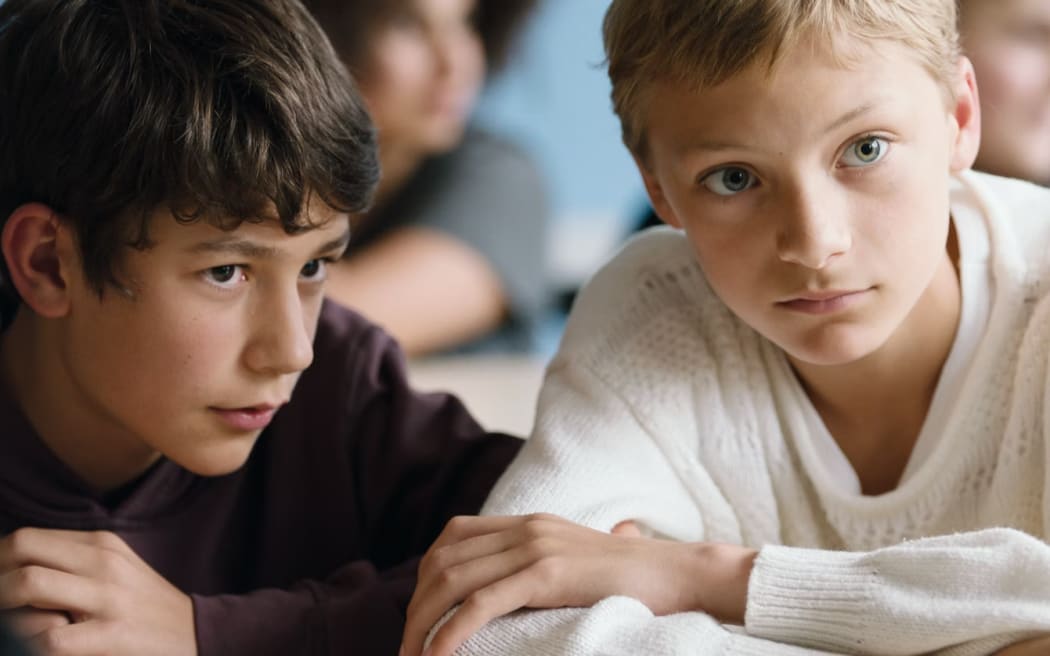There’s been a late run of quiet little art-films in our cinemas, often from last year’s international film festivals. The most recent – Close - is a film from Belgium that picked up the Grand Prix at Cannes last year, then was nominated for an Oscar for Best International Film.
It opens on two 13-year-old boys, Remi and Leo, playing happily out in the countryside.

Photo: Diaphana Distribution
They’re not just friends, they’re best friends. They’re inseparable this year – in fact Leo hangs out more with Remi’s family than he does with his own. And this is their last day of freedom before they start high school.
They flop on the grass with Remi’s bohemian mother between them and wonder what the year will offer.
Remi is quiet and artistic. He actually plays oboe in a children’s orchestra.
Hyperactive Leo has no idea what he wants yet. Perhaps he can manage Remi’s career as a world-famous, freelance oboe-player, travelling the world.
Their first day at high school is made easier by the fact they’re in the same class. And their easy, intimate friendship is noticed by their class-mates.
And finally someone asks the question: “Are you two together, nudge nudge wink wink…”
And at this moment everything changes – for Leo at any rate. He’s a boy who’s always keen to be part of the group, as well as Remi’s mate.
And for the first time he starts to think how other people may see their friendship. Is it just friendship?
Described baldly like this, the film Close seems more brutal and obvious – I won’t say “woke” - than it is. It’s essentially a film about friendship rather than the usual coming of age story.
It’s that moment before you realise you have to come of age, when the most important – and least complicated - relationship you have in life is with your best friend, before you care what anyone else thinks of it.
And Remi doesn’t care what the football boys think. He’s happier hanging out with the girls anyway.
But for Leo, the opinion of the cool crowd is suddenly hugely important. He joins the boys ice hockey team and starts to spend less time with Remi.
Hurt and bewildered, Remi can’t understand what’s happening with Leo, why he’s distancing himself from his best friend.
Leo tells him nothing’s changed. He’s just busy, he’s got new interests. But when Remi comes along to watch Leo practice with the team, Leo snubs him.
The marvellous thing about Close is how carefully writer-director Lukas Dhont tells his simple, at times heartbreaking story.
Dhont made his name with Girl, the story of a trans girl’s dream of becoming a ballet dancer. Close taps into his own childhood memories, and the performances he gets from the two boys are at times uncannily accurate.
It’s a story that distills friendship to its purest form, then shows what happens when outside forces intrude on it.
When things change drastically halfway through Close, there are two equal and opposite forces at work – the desire to move on, to grow up, and the overpowering wish to go back to how it was before.
The intensity of a certain type of childhood emotion is what’s captured in Close - when feelings are so intense because the people experiencing them are so incapable of verbalizing it.
And the bittersweet feeling you get after watching it is that you’ll never repeat the power of its two child stars - Eden Dambrine and Gustav De Waele.
Two years on, they’re almost grown up now. They’re clearly enjoying all the awards shows, but the brilliant performances that took them there are now in the increasingly distant past.

